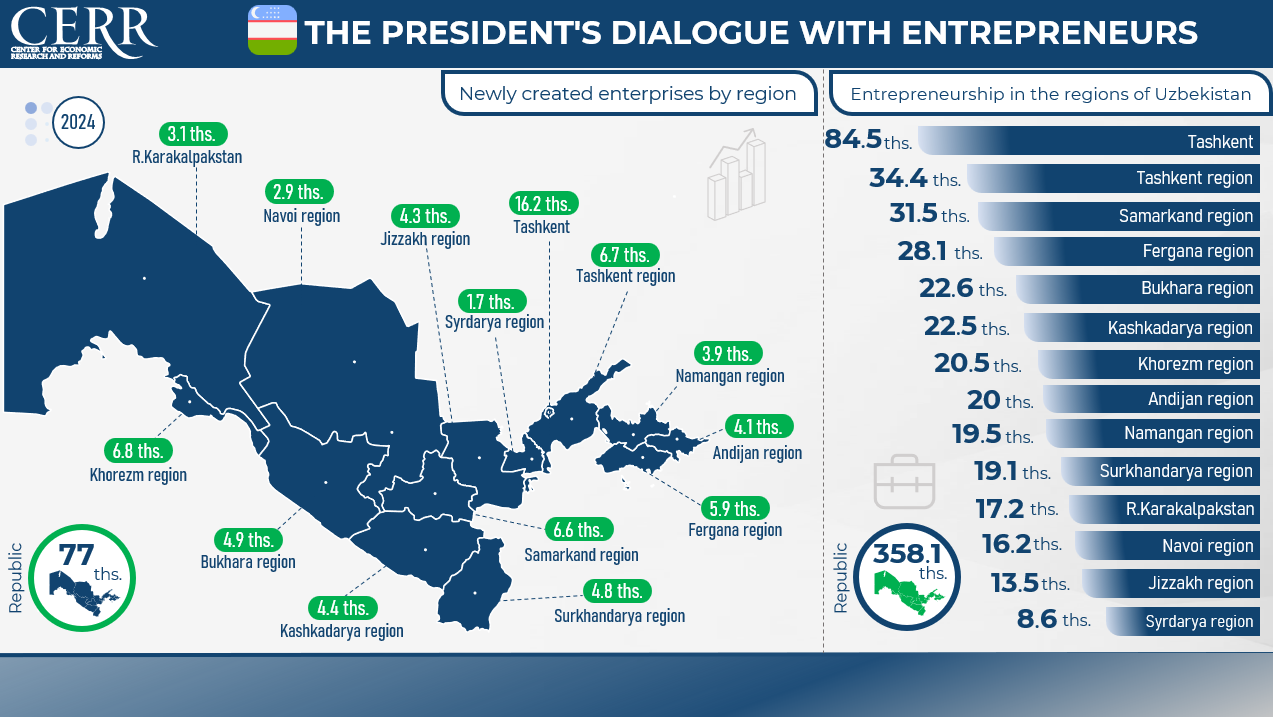In 2024, the annual open dialogue of the President of the Republic of Uzbekistan with entrepreneurs was held in the Republic of Karakalpakstan. This became an important event both for the region and for the entire country, underscoring the government’s commitment to creating a favorable business environment, attracting investment, and supporting initiatives across a wide range of sectors.
In 2025, preparations for the next meeting have already begun; the format will remain the same, but the dialogue will take on new emphases. The platform will not only allow entrepreneurs to voice their proposals but also present systemic solutions for further liberalization of the business environment and the development of the private sector.
Step by step, business development has become a hallmark of the state’s modern economic policy. The open dialogue between the head of state and entrepreneurs has turned into a key instrument of fostering a supportive business climate. These meetings strengthen trust between the government and the private sector, providing a direct channel for discussing pressing issues and jointly finding solutions. As a result of these dialogues, concrete measures are introduced to simplify business operations, reduce administrative barriers, digitalize public services, and expand access to financial resources for entrepreneurs.
Special attention is given not only to streamlining procedures and increasing transparency but also to promoting social responsibility among entrepreneurs, encouraging innovation, and supporting export-oriented projects. Such a comprehensive policy creates the conditions for small businesses to establish stable positions domestically and actively expand into international markets.
In recent years, this approach has produced tangible results: small and medium-sized businesses account for more than half of GDP, about one-third of exports, and a significant share of employment. The steady growth of these indicators confirms that the entrepreneurial sector has become the main driver of economic diversification, opening new opportunities for Uzbekistan’s integration into global trade. These processes are shaping a more resilient and competitive market that provides long-term contributions to the country’s development.
Looking at entrepreneurial activity in 2024, the past year confirmed the crucial role of small business in Uzbekistan’s economy. In 2024, its contribution to GDP amounted to 54.3%, to exports – 33.3%, and to industry – 32.4%. The most dynamic growth of small enterprises was observed in trade, with an 84% increase, in construction – 76.5%, and in services – 57%. These figures clearly demonstrate that entrepreneurial activity is the locomotive of economic growth and diversification.
According to the National Statistics Committee, 77,000 new enterprises were established in 2024, bringing the total number of operating businesses to 358,100. Trade led the way with 28,000 new enterprises. Industry accounted for 12,800 new entities (16.6%), agriculture – 9,100 (11.8%), and accommodation and catering – 6,500 (8.4%). Construction represented 5.1% of new businesses, information and communications – 3.8%, transport and storage – 3.5%, and healthcare – 1.9%. Other activities accounted for 9,400 enterprises, or 12.2%.

Regional dynamics also show a noticeable revival. The largest number of new enterprises was created in Tashkent city – 16,200, followed by Tashkent region with 6,700, Samarkand region with 6,600, Fergana region with 5,900, and Khorezm region with 6,800. Meanwhile, in Bukhara, Kashkadarya, Surkhandarya, and Jizzakh regions, the number of new businesses exceeded 4,000. In Andijan and Namangan regions, 4,100 and 3,900 new enterprises were registered respectively. Even in comparatively less active regions such as the Republic of Karakalpakstan, Navoi, and Syrdarya regions, positive trends in new business creation persisted. This demonstrates that entrepreneurial activity is spreading nationwide.
In terms of the total number of operating enterprises, Tashkent city leads with 84,500 businesses, accounting for nearly a quarter of all enterprises in the country. It is followed by Tashkent region with 34,400, Samarkand with 31,500, and Fergana with 28,100. In Bukhara and Kashkadarya regions, there are more than 22,000 enterprises each, in Khorezm – 20,500, and in Andijan and Namangan – about 20,000 each. In smaller regions by population, such as Jizzakh and Syrdarya, there are 13,500 and 8,600 enterprises respectively.
These data confirm that small and medium-sized businesses in Uzbekistan are not only the backbone of the economy but are also becoming increasingly resilient. The growth in the number of enterprises, their diversification across sectors and regions, and their active participation in exports are a direct result of ongoing reforms and efforts to liberalize the business environment.
The upcoming dialogue between the President and entrepreneurs in 2025 will serve not only as a forum to summarize results and discuss challenges but also as a platform for generating new initiatives. The focus will be on expanding access to financial resources for businesses, digitalizing public services, stimulating innovative projects, and strengthening the positions of domestic producers in foreign markets. The event is expected to be another important step toward achieving the country’s strategic goals of building a competitive and sustainable economy.
CERR Public Relations Sector























leave a comment